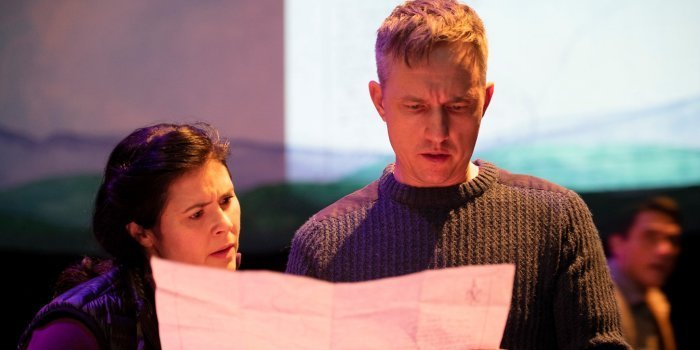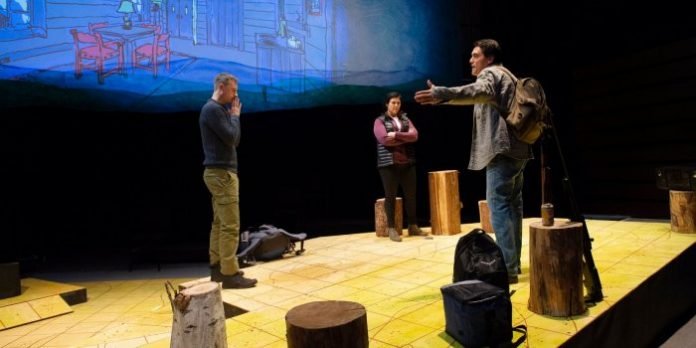Inheritance: A pick-the-path experience is a choose your own adventure mixed with a challenging social experiment and a healthy dose of reconciliation education. It forces settler audiences to confront not just their personal history and complicity in colonization but also those of the rest of the audience. Creating a buzz-worthy experience, audience members are forced to watch their beliefs merge or diverge from those of the majority – a confrontational experience that forces an individual reckoning that would be impossible outside this style of theatre.
At its core, Inheritance is the story of Abbey, a white settler and third-generation Canadian who travels back to the family homestead with drummer boyfriend in tow, to assist her father in finalizing its sale to build an eco-park that she has already sunk $80,000. But when they arrive at the homestead’s remote cabin they find only local indigenous man Frank, a bloodstain, and a missing phone. Frank soon reveals that Abbey’s father had agreed to return the land to Frank’s people before he left, much to Abbey’s shock.
What happens next is up to the audience.
The play’s progression is controlled by the audience via a remote control that allows them to select the story path according to a set of options. Perfectly integrated, the remote uses the technology of a first-year economics class and turns it into a teaching tool for race and colonial history. Not only does the audience get to vote on the potential outcomes, but they get to see the votes of those sitting next to them, taking the difference of opinion out of the theoretical and making it real.
The other added bonus is the visual storytelling of raised stakes. Audiences become invested in their choices, and the verbal murmurs of the crowd after the majority’s will is revealed is fascinating. The downside is that at times it takes too long to make the decision, which kills the narrative tension. But the benefits far outweigh the negatives.

Inheritance is about perspective. It is important to note that this reviewer is a white settler of second-generation Dutch heritage. My grandparents fled the war to farm on stolen lands. This bias and perspective are always essential to note when reviewing but are particularly relevant when looking at Inheritance: A pick-the-path experience as that heritage frames the view this reviewer brings to this experience.
What Inheritance does so well, better than most public media on reconciliation, is force a confrontation not just between characters, but between audience members, and most critically between audience members and their own lived experiences. It allows audiences to experience shortcomings, identify resources and refuses to back down from any examination in settler complicity. There is no space given to excuses. No space for audiences to throw up their hands and “do nothing.” And it does so in a way that still feels safe, without accusation, and with a focus on the next steps.
The play is performed by its creators, and their comfort with the conflicts created in the show allows the primarily settler audience to explore these issues without feeling called out. All characters are equally complex and sympathetic, which forces audiences to examine the assumptions they bring into the theatre as these assumptions are the only “hunches” the audience can use to base their decisions upon.
Medina Hahn’s Abbey is stubbornly intent with a fierce possessiveness over her father and her land that is as understandable as it is uncomfortable. Daniel Arnold, as drummer boy Noah plays the comic relief who doubles as a more receptive middle ground as the play progresses. Darrell Dennis, as Frank is the most compelling as he forges a path of wry emotional labour with wit and humour, which belies the mysterious circumstances we find him in.
Lauchlin Johnston’s set is a ruptured map of angles and juxtaposed lines that creates a sense of disrupted place that may be one of the best designs Vancouver has seen in years. The projections by Chimerik slide above our heads like koi while the lighting design by Jillian White lends a sense of game show chic to the ever-increasing tensions on the play.
Ultimately, Inheritance is what theatre should be. It breaks boundaries, embraces new technology, asks hard questions, educates, and forces the audience to look in a mirror to see themselves and their shortcomings. It is a quest entered lightly that leaves one changed.
Inheritance should be required viewing for any settler living on unceded lands and recommended viewing for everyone else. It is excellent. See it, ask questions, and enjoy the beauty of these incredible artists along the way.
Inheritance: a pick-the-path experience by Daniel Arnold, Darrell Dennis, and Medina Hahn. Directed by Herbie Barnes. An Alley Theatre and Touchstone Theatre co-production, in association with Vancouver Moving Theatre and community partnership with the Vancouver Aboriginal Friendship Centre. On stage at The Annex (823 Seymour St, Vancouver) until March 15. Visit alleytheatre.ca for tickets and information.

